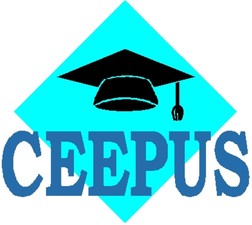CEEPUS
Basic information
CEEPUS (Central European Exchange Programme for University Studies) is a multilateral international program supporting cooperation among universities in the field of education.
Currently, 15 countries are involved in the program: Albania, Bosnia and Herzegovina, Bulgaria, Montenegro, the Czech Republic, Croatia, Hungary, North Macedonia, Moldova, Poland, Austria, Romania, Slovakia, Slovenia, and Serbia. Universities in Kosovo, including Priština, Prizren, and Peja, also participate.
For more information, you can visit the CEEPUS program website or the website of the Center for International Cooperation, which serves as the national coordinator for the program.
Students receive credit recognition for courses taken at foreign institutions.
Selection procedures for the upcoming academic year's summer semester occur in October, and for the winter semester of the following academic year, they take place in March-April.
For whom the program is intended
The program is designed for all students from the completed second semester onwards and academic staff at public higher education institutions.
Types of stays within the network
Semester Stay
- For students in Bachelor's, Master's, Doctoral, and Postdoctoral studies with citizenship in a CEEPUS member country
- Duration: minimum 3 to maximum 10 months
Short-Term Stay
- For Ph.D. students and Bachelor's and Master's students working on their theses
- Duration: 1 month (minimum 21 days)
Teaching Stay
- For university teachers
- Duration: minimum 5 days to maximum 1 month
Freemover Mobility
- Takes place only in the summer semester
- A type of mobility where the student independently chooses the host institution in one of the CEEPUS member countries
- The student must secure acceptance at the chosen institution (without any fees)
- Application is submitted without a selection process at the sending institution
- Funding is carried out similarly to standard mobilities
- The student arranges the following documents:
- Letter of Acceptance from the host institution
- Letter of Recommendation from the sending institution
Funding
- Travel expenses are covered by the sending institution
- A grant for living expenses is provided by the host institution
Administration
- All processes are conducted electronically through the portal www.ceepus.info
- The only printed document is the Letter of Confirmation, which the student brings from abroad as proof of completing the study stay
CEEPUS Networks at UP
Palacký University is a member of the following networks of the CEEPUS programme
| Number | Name | UP Faculty | UP Department | UP Coordinator |
| AT-0502-14-2324 | Bioethics | CMTF | Department of Systematic Theology | doc. Mgr. Dominik Opatrný, ThD. |
| CZ-1601-03-2324 | Media Ethics | CMTF | Department of Communication Studies | doc. Mgr. et Mgr. Jaroslav Franc, Th.D. |
| AT-0037-19-2324 | Slavic Philology and Its Cultural Contexts | FF | Department of Slavonic Studies | Mgr. Martina Pálušová, Ph.D. |
| AT-0037-19-2324 | Slavic Philology and Its Cultural Contexts | FF | Department of General Linguistics | Ing. Mgr. Lenka Pivoňková |
| AT-0119-00-2223 | *e-Bologna* - Network for Translation Studies nd Transcultural Communication Programmes in Central, Eastern and South-Eastern Europe | FF | Department of English and American Studies | Mgr. Ph.D. Petra Bačuvčíková |
| AT-0503-13-2324 | Inter-American Studies | FF | Department of English and American Studies | Dr. David Livingstone |
| CZ-0029-19-2324 | European history, politics, culture and memory | FF | Department of History | doc. Mgr. Radmila Švaříčková Slabáková, Ph.D. |
| CZ-0604-13-2324 | South and North Korea, Korean and Koreans: Research, Research Based Teaching & Networking for Synergies in Central and Eastern Europe | FF | Department of Asian Studies | Mag. Andreas Schirmer, Dr. |
| PL-0012-19-2324 | Language and literature in a Central European context | FF | Department of Dutch Studies | Drs. Bas Hamers |
| SI-0711-12-2324 | TRANS - TRANSkulturelle Kommunikation und TRANSlation | FF | Department of German Studies | Mgr. Ph.D. Petra Bačuvčíková |
| BG-1103-08-2324 | Modelling, Simulation and Computer-aided Design in Engineering and Management | Department of Technical Education and Information Technology | Mgr. Tomáš Dragon | |
| CZ-1503-04-2324 | Development of Computational Thinking | Department of Technical Education and Information Technology | Mgr. Tomáš Dragon | |
| HR-1005-09-2324 | Educational Systems in Central Europe | Department of Primary and Pre-primary Education | Mgr. Alena Vavrdová, Ph.D. | |
| HU-0019-19-2324 | International Cooperation in Computer Science | Department of Technical Education and Information Technology | Mgr. Tomáš Dragon | |
| HU-0028-17-2324 | Active Methods in Teaching and Learning Mathematics, Informatics and their Applications | Department of Mathematics | doc. RNDr. Jitka Laitochová, CSc. | |
| HU-0028-17-2324 | Active Methods in Teaching and Learning Mathematics, Informatics and their Applications | Department of Technical Education and Information Technology | Mgr. Tomáš Dragon | |
| HU-0028-17-2324 | Active Methods in Teaching and Learning Mathematics, Informatics and their Applications | Institute of Education and Social Studies | prof. RNDr. Josef Molnár, CSc. | |
| HU-0028-17-2324 | Active Methods in Teaching and Learning Mathematics, Informatics and their Applications | PřF | Department of Algebra and Geometry | prof. RNDr. Josef Molnár, CSc. |
| RO-0013-19-2324 | Teaching and Research of Environment-oriented Technologies in Manufacturing | Department of Technical Education and Information Technology | Mgr. Tomáš Dragon; | |
| CZ-0111-17-2223 | GEOREGNET | PřF | Department of Geography | Mgr. Petr Šimáček, PhD. |
| PL-0062-19-2324 | Applied Geoinformatics (CEE-GIS) | PřF | Department of Geoinformatics | doc. RNDr. Jaroslav Burian, Ph.D. |
